 |
Outstanding Contributions
to ISCB Award
Scott Markel, PhD |
2024 Outstanding Contributions Award: Scott Markel, PhD
Scott Markel, PhD,BIOVIA R&D Software Engineering Director, Biosciences & Scientific Informatics, Dassault Systèmes
Scott Markel, Ph.D., is an R&D Software Engineering Director in Dassault Systèmes’ BIOVIA Biosciences & Scientific Informatics group. In this role he is responsible for Discovery Studio and Pipeline Pilot’s scientific functionality. He is a former member of the Executive Committee and Board of Directors of the International Society for Computational Biology. Scott is on the editorial board of PLOS Computational Biology, co-editing the popular Ten Simple Rules series. He co-authored Sequence Analysis in a Nutshell: A Guide to Common Tools and Databases and co-edited In Silico Technology in Drug Target Identification and Validation.
ISCB will present the Accomplishments by a Senior Scientist Award, Overton Prize, Innovator Award and Outstanding Contributions to ISCB Award, at ISMB 2024 (www.iscb.org/ismb2024), which will take place in Montreal, Quebec, Canada, July 12-16, 2024.
Full bibliographical articles profiling the award recipients will be available in the ISMB 2024 focus issue of the ISCB newsletter later this year, as well as the ISCB Society Pages in OUP Bioinformatics.
top
>> Return to List of Outstanding Contributions Recipients
|
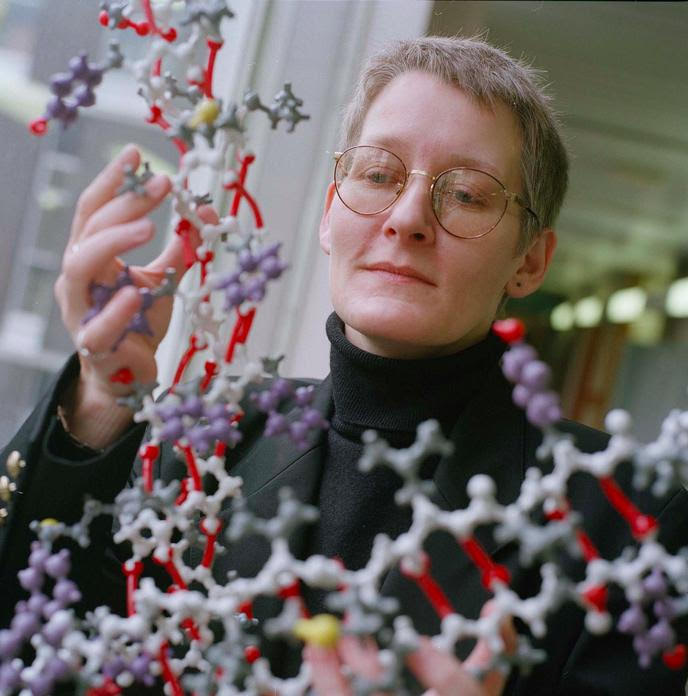
|
2021 ISCB Outstanding
Contributions Award:
Teresa Attwood, PhD
|
2021 ISCB Outstanding Contributions Award: Teresa Attwood, PhD
Teresa Attwood, PhD, Professor, the Department of Computer Science and School of Biological Sciences at the University of Manchester
The Outstanding Contributions to ISCB Award recognizes an ISCB member for outstanding service contributions toward the betterment of ISCB through exemplary leadership, education, and service. The 2021 recipient of the Outstanding Contributions to ISCB Award is Teresa Attwood.
Teresa Attwood is a Professor of Bioinformatics in the Department of Computer Science and School of Biological Sciences at the University of Manchester and a visiting fellow at the European Bioinformatics Institute (EMBL-EBI).
A visionary within the field, she saw early on the power of bioinformatics education from the beginning. Teresa Attwood coauthored (with Paul Higgs) one of the first books in bioinformatics, which became a reference in Universities worldwide. Teresa was quick to recognize that ISCB was ideally situated to lead the global promotion for a strong bioinformatics education.
Teresa Attwood has been a champion of the bioinformatics education community where she has been instrumental in putting in place ISCB platforms that allow the education community to highlight their work and which raise the awareness of ISCB as a leader in bioinformatics education globally.
A longstanding and involved ISCB member, Teresa Attwood continued to further bioinformatics education on behalf of the global bioinformatics community and ISCB through many years of service. In 2001 she joined Phil Bourne’s ISCB Education Working Group to define the topic areas in a complete bioinformatics curriculum and identify the available learning resources. This group was the precursor of the creation of the ISCB Education Committee (2002).
Attwood was instrumental in launching the Global Organization for Bioinformatics Learning, Education and Training (GOBLET, 2012) as a network of global training organizations and individuals. Understanding the need to link GOBLET with ISCB, Terri worked with Fran Lewitter on the ISCB Education Committee Leadership Task Force (Summer 2016) to align the missions of GOBLET with those of ISCB and the emerging Education COSI, thereby ensuring the two organizations work in harmony towards their respective goals.
Teresa Attwood is being recognized for her many years of significant contributions to both ISCB and the broad bioinformatics and bio-curation communities.

ISCB will present the Accomplishments by a Senior Scientist Award, Overton Prize, Innovator Award and Outstanding Contributions to ISCB Award, at ISMB/ECCB 2021 (https://www.iscb.org/ismbeccb2021), which will take place in virtually, July 26-30, 2021.
Full bibliographical articles profiling the award recipients will be available in the ISMB/ECCB 2021 focus issue of the ISCB newsletter later this year, as well as the ISCB Society Pages in OUP Bioinformatics, and F1000 Research ISCB Community Journal.
top
>> Return to List of ISCB Outstanding Contributions Award Recipients
|
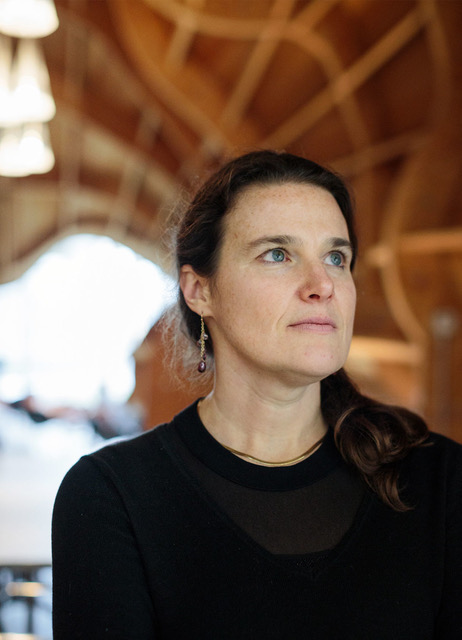
|
2021 Overton Prize Winner:
Barbara Engelhardt, PhD
|
2021 ISCB Overton Prize: Barbara Engelhardt, PhD
Barbara Engelhardt, PhD, Associate Professor at Princeton University, New Jersey, United States
The Overton Prize recognizes the research, education, and service accomplishments of early to mid-career scientists who are emerging leaders in computational biology and bioinformatics. The Overton Prize was instituted in 2001 to honor the untimely loss of G. Christian Overton, a leading bioinformatics researcher and a founding member of the ISCB Board of Directors. Barbara Engelhardt is being recognized as the 2021 recipient of the Overton Prize.
Barbara Engelhardt joined the Princeton Computer Science Department in 2014 from Duke University, where she had been an assistant professor in Biostatistics and Bioinformatics and Statistical Sciences. She graduated from Stanford University and received her Ph.D. from the University of California, Berkeley.
Barbara Engelhardt’s research is in developing statistical models and machine learning methods for the analysis of biomedical data, with a focus on studying complex associations, time-series, sequential decision-making, and predicting the effects of perturbations in human cohorts, single cell data, and hospital patient data. In the field of single cell genomics, dimension reduction is a pressing problem and she has contributed a scalable and robust approach to dimension reduction using a Gaussian process latent variable model (GPLVM) with t-distributed residuals. Her group also developed approaches to determine the specific set of genes that differentiate particular types of cellular pathology images using machine learning methods like convolutional autoencoders and sparse canonical correlation analysis. Her research has a reputation for producing rigorous and creative statistical approaches for the analysis of complex biomedical data.
As part of the Genotype-Tissue Expression (GTEx) Consortium, Dr. Engelhardt performed key analyses to identify regulatory DNA variation that is linked to distal gene expression changes (“trans-eQTLs”). In the context of this large scale experimental effort, she determined trans-eQTLs across 49 human tissues and 838 individuals. Notable results include a confirmation of the greater tissue specificity of trans-eQTL versus mutations that are nearby the gene they regulate. Based on her expertise and creativity she has contributed numerous novel machine learning and statistics methods to important projects from genomics, population genetics, and human genetics.
Barbara Engelhardt has been an outspoken advocate for women and under-represented groups in the sciences. She has used her voice to advocate on behalf of these groups both through traditional means and on social media. Notably, Dr. Engelhardt's research group, housed in a computer science department, currently includes five women graduate students and postdocs and she has served as a mentor, both formally and informally for many women and individuals from under-represented groups, proving Dr. Engelhardt's status as a leader in the field of computational biology and bioinformatics.

ISCB will present the Accomplishments by a Senior Scientist Award, Overton Prize, Innovator Award and Outstanding Contributions to ISCB Award, at ISMB/ECCB 2021 (https://www.iscb.org/ismbeccb2021), which will take place in virtually, July 26-30, 2021.
Full bibliographical articles profiling the award recipients will be available in the ISMB/ECCB 2021 focus issue of the ISCB newsletter later this year, as well as the ISCB Society Pages in OUP Bioinformatics, and F1000 Research ISCB Community Journal.
top
>> Return to List of Overton Prize Recipients
The ISCB Student Software Prize
Congratulations to TEPIC, ISCB's 2019 student Software Award winner!
The ISCB Student Software Prize was created to recognize the development of excellent bioinformatics software by students and postdocs that are members of the International Society for Computational Biology.
The winner(s) of the ISCB Student Software Prize will receive the prize of their choice:
- Complimentary ISCB membership
- Free registration to any official ISCB conference, at membership rate.
Prize Winner (s) will be announced in ISCB’s Spring Newsletter!
If you are an ISCB Member and a Student or Postdoc who has created bioinformatics software you would like to share, submit your work for a chance to win the ISCB Student Software Prize!
How to Submit Your Software
Use the link provided below to submit a brief cover letter stating the purpose of the software, the scope of the nominees contribution, the distribution license and URL to the software along with a manuscript or a reprint.
Student Requirements:
- Must be a major contributing author of the software being developed
- An ISCB member in good standing at both the time of submission and acceptance
- Students or postdoc at an accredited degree-granting institution at the time of the nomination
Software Requirements:
- The software must be usable on at least one of the major operating systems (Un*x, MacOS, Windows)
- The software must be distributed under an open source license that allows for reuse and is recognized by the Open Source Initiative. https://opensource.org/licenses/category
Self-nominations are accepted
Software may be nominated more than once, as long as it has not been awarded the prize yet.
Each nomination is limited to a single piece of software and three (3) student/postdoc-developers.
Submit your Software
For all submission questions, please reach out to This email address is being protected from spambots. You need JavaScript enabled to view it..
top
2019 ISCB Art in Science Competition
Dr. Kliment Olechnovic
Department of Bioinformatics, Life Sciences Center
Vilnius University
Lithuania
Disassembled Tessellation
2018 ISCB Art in Science Competition
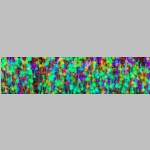 Marwan Abdellah
Marwan Abdellah
École polytechnique fédérale de Lausanne (EPFL)
In Silico Brainbow
In silico brainbow optical section of a neocortical slice (920 × 640 × 1740 μm3) created with a virtual light-sheet fluorescence microscope (LSFM).
The simulation of the LSFM is performed on a physically-plausible basis using Monte Carlo ray tracing and geometric optics. The tissue model is reconstructed in a three-step process: 1) converting the morphological skeletons of the neurons into piecewise surface meshes that represent their membranes, 2) reconstructing a volumetric model of the tissue using solid voxelization and finally 3) tagging the neurons with the optical properties of the neocortical tissue and also the spectroscopic properties of different fluorescent dyes.
The slice is virtually-tagged with six different fluorescent proteins (GFP, CFP, eCFP, mBanana, mCherry and mPlum) and illuminated at the maximum excitation wavelength of each respective dye.
2018 ISCB Art in Science Competition
Alaa Abi Haidar
University of Pierre and Marie Curie
dEYEversity
The two contrasted eyes are composed of the same ingredients and diversity of eyes, ad infinitum. The artist owns all images’ rights.
Featured at La Nuit de la Photographie Contemporaine and soon in a gallery.
As for the technique, I developed image processing algorithms to crop the eyes from the 1001faces.org project to have them automatically reassembled in this mosaic using another algorithm that optimizes the images' position according to the best matching pixel intensities.
2018 ISCB Art in Science Competition
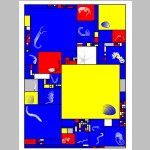 FIRST PLACE
FIRST PLACE
Ruth Callaway
Swansea University, Biosciences, UK
Mondrian’s Sum of Squares
Science inspired many artist, but here it was the other way around. The visualisation of marine biodiversity data was modelled on paintings by the early 20th century Dutch artist Piet Mondrian. It is an ongoing challenge for ecologists to compress and simplify complex data and to illustrate patterns in marine ecosystems. Differently coloured and sized rectangles and squares were assembled in this Mondrian’s Sum of Squares and simultaneously shows numerical and taxonomic information of a benthic invertebrate seafloor community (Swansea Bay, Wales, UK). Each field, large or small, represents a different species. The size of the square or rectangle indicates how numerically common a species was, and colours indicate taxonomic or functional groups (blue: polychaete worms, yellow: bivalves, red: crustaceans, white: other mobile species, grey: other sessile species). The few large squares highlight that the seafloor community consists of just a handful of common species, while most occur in low densities. The overwhelming number of blue fields shows the importance of worm species for biodiversity. Like many of Mondrian’s paintings, this artwork is an abstract representation of the natural world. It differs in that Piet Mondrian deliberately stepped away from reality, while this work translates scientific data into art.


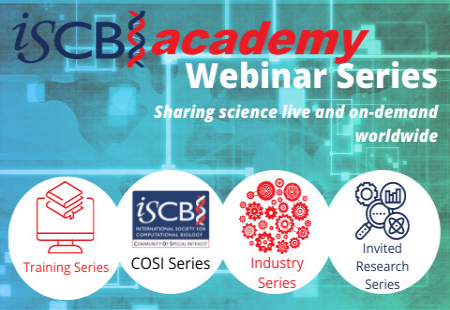

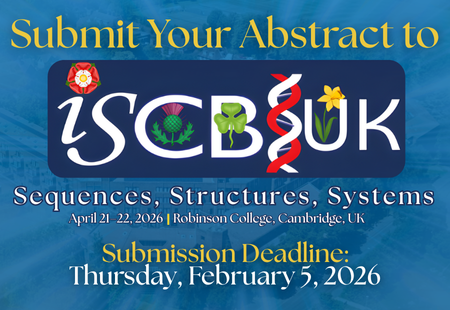
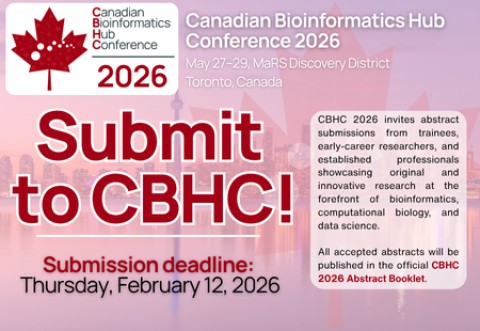
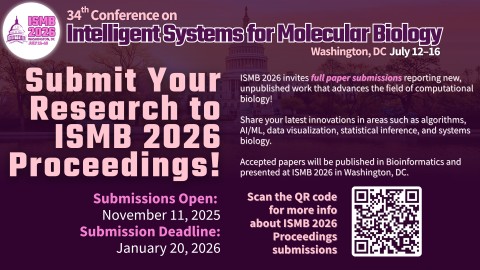




















 Marwan Abdellah
Marwan Abdellah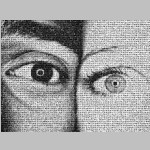
 FIRST PLACE
FIRST PLACE



